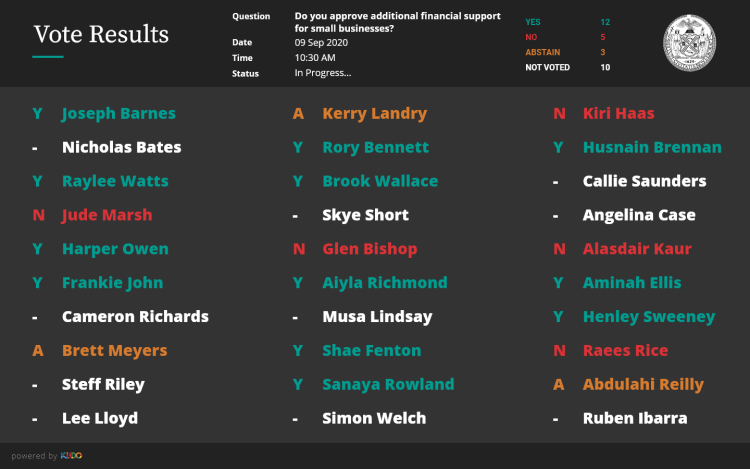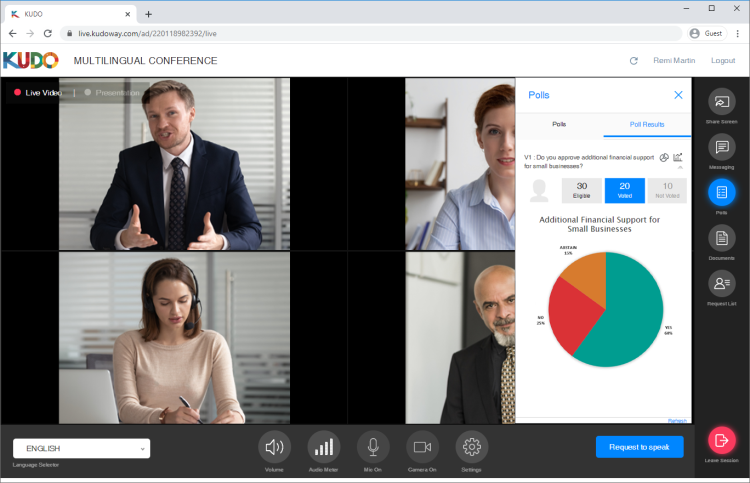Cloud-based multilingual meeting tool KUDO is perfectly positioned to support global organisations through Covid-19 and well into a post-pandemic future. Fardad Zabetian talks to Anna Mitchell.
Regular readers of Inavate may be able to cast their minds back to January 2019 when we first reported on KUDO – a US-based start-up offering multilingual web based conferencing.
Returning to catch up with KUDO founder and CEO Fardad Zabetian puts the huge transformation the world has gone through in two years in perspective. No one could have predicted just how much has changed and even the most ambitious projections for KUDO wouldn’t have touched where the company finds itself today.
Talking to Zabetian via KUDO, he’s almost totally alone in the company’s New York office. That’s an indication of the pandemic we’re stillgrapplingwith, asituation that has also rapidly accelerated KUDO’s development and uptake. It isn’t however indicative of the growth KUDO has been through. The 10-person-strong team at the beginning of 2019 has now swelled to more than 75. Zabetian may have the headquarters largely to himself but across the world KUDO has built – indeed is still in the process of building – a formidable army of technologists, client success specialists and sales and marketing professionals. APAC is set for even faster growth this year with heavy expansion planned for the region.

Image credit: NATO
Recent recruits include the addition of Pegah Ebrahimi, former COO of Cisco Collaboration, to the KUDO advisory board, and Professor Barry Slaughter Olsen as vice president of client success – a relatively new department in KUDO focused on onboarding and support for enterprise clients.
It was back in 2016 that the seeds of KUDO were planted. “We saw the digital transformation of meetings back then to a more decentralised approach,” says Zabetian, a veteran of the conferencing space through experience as founder and CEO of Media Vision.
Through Media Vision, Zabetian had vast experience with multilingual and moderated meetings, as well as government and parliamentary proceedings. He started work on building the KUDO platform, drawing on that knowledge of frustrations and understanding of client needs that weren’t being met, to create a product.
“When we launched we already had a great market fit on day one,” he says. “We directly targeted the margins, specific spaces that demanded multilingual decentralised meetings.

“At the same time, we also had the AV background, we understood the equipment, the standards, the I/Os present in a conference room, boardroom, training room. We designed a software platform that could tie into the standard audio, video and control signal routing.
“One of the features of KUDO is that accounts can be added for ‘audio manager’. This allows someone to remotely connect to a meeting and set up all the I/Os via Dante. From one computer with a Dante card, they can connect up to 32 channels of audio routing in and out of existing third-party conference room systems. On the broadcast side we can stream using various protocols like HLS or RTMP, to interface with third-party webcasting platforms.”
Zabetian describes this intersection of experience in the meetings and conference space with AV integration knowledge as KUDO’s “unfair advantage”.
While KUDO was built on deep understanding and to some extent a prediction of where the meeting space was heading, what couldn’t have been foreseen was the coronavirus pandemic.
“When you look back at our original first five year business plan and company blueprint of where we expected to be, you see that the pandemic has accelerated our user adoption by two years,” he says.
That’s significant for any company. For a technology start-up where product development time is often underestimated, it’s exceptional.
“Moving online during the pandemic really opened the eyes of many decision makers, many enterprises that the future of work is global and it’s multilingual,” says Zabetian.
Over the last year knowledge workers, office based staff, educators and more have witnessed, and almost certainly been part of, a seismic shift to remote working and collaboration that has seen the use of videoconferencing explode. However, seeing KUDO’s growth simply a beneficiary of that explosion ignores parallel trends that are making the need for easier access to interpretation crucial.
Sure, part of KUDO’s accelerated growth is absolutely due to workers being forced apart, travel shutting down and meetings driven online. But it’s about more than that.
“It’s important to recognise that the smartest and most talented people for a job, or act as an expert on a specific topic might not speak your language,” Zabetian explains. “As far as access to talent goes, taking a global approach from a very early stage in a business will help create better teams, better diversity within teams, greater ideas and also a better product market fit because you’re developing product with feedback from different markets.”
The idea is simple and hard to argue with. If you don’t engage a global team early, global expansion will be hindered and slower.
“Moving online during the pandemic really opened the eyes of many decision makers, many enterprises that the future of work is global and it’s multilingual.” – Fardad Zabetian
“Our goal is to break language barriers for businesses by adding live language translation to video meetings, online conferencing and even on site meetings,” says Zabetian. “We are making language more accessible and affordable for businesses so they don’t have to invest in infrastructure. At the same time, we are designing and providing additional features for specific types of users.”
Many of these features are focused at the parliamentary side of KUDO’s business. These are heavy and experienced users of interpretation services as part of formal assemblies. KUDO isn’t replacing those needs but it is allowing them to be more agile, something that was needed but also became crucial as Covid-19 hit.
“We’ve built our own version of the United Nations in the cloud,” explains Zabetian. “The Nato and Nato parliamentary, the UN, the World Bank, the Council of Europe; they’re all using KUDO and they’re using features such as speech timer, voting, points of order and features we design specifically for them. When it comes to videoconferencing, no one size fits all, especially when it comes to moderated parliamentary meetings.”
As well as meeting needs to ensure assemblies or conferences run smoothly, KUDO is shaking up the sector in new and disruptive ways. Under the control of KUDO’s head of innovation Dr Professor Claudio Fantinuoli, AI is a big development area. AI baked into KUDO’s cloud platform already will help interpreters to prepare for meetings in shorter times and increases the quality of interpretation.
This is all setting KUDO up for a world way beyond the pandemic but one which won’t look much like the world we left behind either.
“The future of meetings will be hybrid, you’ll need to provide access for those that are not on site,” predicts Zabetian. “The event industry will go back to in-person events but I think in 2020 many people realised that you could reduce business trips and still get the job done.”
KUDO’s been built to integrate with existing meeting room infrastructure so perfectly fits into a hybrid future.
“If I’m a board member and the board is going to vote to elect the next budget committee, I can do everything as either a participant in the room using existing infrastructure, or remotely via a mobile device or a computer with all the security provisions you’d expect,” explains Zabetian.
Those capabilities improve access for anyone that can’t travel to a meeting for whatever reason, opening up proceedings to those who have limited options due to dependents, other commitments or even their own health and mobility. And from that perspective KUDO is breaking not only language barriers, but all sorts of barriers to inclusion.